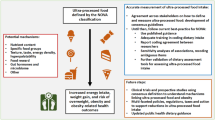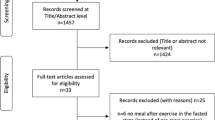Abstract
Background/Objectives:
Long-term success of weight loss diets might depend on how the appetite regulatory system responds to energy restriction (ER). This study determined the effect of 24 h severe ER on subjective and hormonal appetite regulation, subsequent ad libitum energy intake and metabolism.
Subjects/Methods:
In randomised order, eight overweight or obese males consumed a 24 h diet containing either 100% (12105 (1174 kJ; energy balance; EB) or 25% (3039 (295) kJ; ER) of estimated daily energy requirements (EER). An individualised standard breakfast containing 25% of EER (3216 (341) kJ) was consumed the following morning and resting energy expenditure, substrate utilisation and plasma concentrations of acylated ghrelin, glucagon-like peptide-1 (GLP-17–36), glucose-dependant insulinotropic peptide (GIP1–42), glucose, insulin and non-esterified fatty acid (NEFA) were determined for 4 h after breakfast. Ad libitum energy intake was assessed in the laboratory on day 2 and via food records on day 3. Subjective appetite was assessed throughout.
Results:
Energy intake was not different between trials for day 2 (EB: 14946 (1272) kJ; ER: 15251 (2114) kJ; P=0.623), day 3 (EB: 10580 (2457) kJ; 10812 (4357) kJ; P=0.832) or day 2 and 3 combined (P=0.693). Subjective appetite was increased during ER on day 1 (P<0.01), but was not different between trials on day 2 (P>0.381). Acylated ghrelin, GLP-17–36 and insulin were not different between trials (P>0.104). Post-breakfast area under the curve (AUC) for NEFA (P<0.05) and GIP1–42 (P<0.01) were greater during ER compared with EB. Fat oxidation was greater (P<0.01) and carbohydrate oxidation was lower (P<0.01) during ER, but energy expenditure was not different between trials (P=0.158).
Conclusions:
These results suggest that 24 h severe ER does not affect appetite regulation or energy intake in the subsequent 48 h. This style of dieting may be conducive to maintenance of a negative EB by limiting compensatory eating behaviour, and therefore may assist with weight loss.





Similar content being viewed by others
References
Bray GA . Medical consequences of obesity. J Clin Endocrinol Metab 2004; 89: 2583–2589.
Roberts CK, Bernard RJ . Effects of exercise and diet on chronic disease. J Appl Physiol 2005; 98: 3–30.
Anderson CJ, Fernandez ML . Dietary strategies to reduce metabolic syndrome. Rev Endocr Metab Disord 2013; 14: 241–254.
Anderson JW, Vichitbandra S, Qian W, Kryscio RJ . Long-term weight management after an intensive weight-loss program. J Am Coll Nutr 1999; 18: 620–627.
Greenberg I, Stampfer MJ, Schwarzfuchs D, Shai I . Adherence and success in long-term weight loss diets: the dietary intervention randomized controlled trial (DIRECT). J Am Coll Nutr 2009; 28: 159–168.
Sacks FM, Bray GA, Carey VJ, Smith SR, Ryan DH, Anton SD et al. Comparison of weight-loss diets with different composition of fat, protein, and carbohydrates. N Eng J Med 2009; 360: 859–873.
Anderson JW, Konz EC, Frederich RC, Wood CL . Long-term weight-loss and maintenance: a meta-analysis of US studies. Am J Clin Nutr 2001; 74: 579–584.
Varady KA . Intermittent verses daily calorie restriction: which diet regimen is more effective for weight loss? Obes Rev 2009; 12: e593–e601.
Varady KA, Bhutani S, Church EC, Klempel MC . Short-term modified alternate-day fasting: a novel dietary strategy for weight loss and cardioprotection in obese adults. Am J Clin Nutr 2009; 90: 1138–1143.
Varady KA, Bhutani S, Klempel MC, Kroeger CM . Comparison of effects of diet versus exercise weight loss regiments on LDL and HDL particle size in obese adults. Lipids Health Dis 2011; 10: 119–123.
Varady KA, Bhutani S, Klempel MC, Kroeger CM, Trepanowski JF, Haus JM et al. Alternate day fasting for weight loss in normal weight and overweight subjects: a randomised controlled trial. Nutr J 2013; 12: 146–153.
Harvie MN, Pegington M, Mattson MP, Frystyk J, Dillon B, Evans G et al. The effects of intermittent or continuous energy restriction on weight loss and metabolic disease risk markers: a randomized trial in young overweight women. Int J Obes 2011; 35: 714–727.
Harvie M, Wright C, Pegington M, McMullen D, Mitchell E, Martin B et al. The effect of intermittent energy and carbohydrate restriction v. daily energy restriction on weight loss and metabolic disease risk markers in overweight women. Br J Nutr 2013; 110: 1537–1547.
Johnstone AM, Faber P, Gibney ER, Elia M, Horgan G, Goldern BE et al. Effect of an acute fast on energy compensation and feeding behaviour in lean men and women. Int J Obes 2002; 26: 1623–1628.
Mars M, de Graaf C, de Groot LCPGM, Kok FJ . Decreases in fasting leptin and insulin concentrations after acute energy restriction and subsequent compensation in food intake. Am J Clin Nutr 2005; 81: 570–577.
Blom WAM, Mars M, Hendriks HFJ, de Groot LCPGM, Stafleu A, Kok FJ et al. Fasting ghrelin does not predict food intake after short-term energy restriction. Obesity 2006; 14: 838–846.
Levitsky DA, DeRosimo L . One day of food restriction does not result in an increase in subsequent daily food intake in humans. Physiol Behav 2010; 99: 495–499.
Cummings EE, Weigle DS, Frayo RS, Breen PA, Ma MA, Dellinger EP et al. Plasma ghrelin levels after diet-induced weight loss or gastric bypass surgery. N Eng J Med 2002; 346: 1623–1630.
Holst JJ . The physiology of glucagon-like peptide 1. Physiol Rev 2007; 87: 1409–1439.
Pasiakos SM, Caruso CM, Kellogg MD, Kramer FM, Lieberman HR . Appetite and endocrine regulators of energy balance after 2 days of energy restriction: insulin, leptin, ghrelin and DHEA-S. Obesity 2011; 19: 1124–1130.
Doucet E, Pomerleau M, Harper ME . Fasting and postprandial total ghrelin remain unchanged after short-term energy restriction. J Clin Endocrinol Metab 2004; 89: 1727–1732.
Heilbronn LK, Smith SR, Martin CK, Anton SD, Ravussin E . Alternate-day fasting in nonobese subjects: effects on body weight, body composition, and energy metabolism. Am J Clin Nutr 2005; 81: 69–73.
Doucet E, Cameron J . Appetite control after weight loss: what is the role of bloodborne peptides? App Physiol Nutr Metab 2007; 32: 523–532.
Stunkard AJ, Messick S . The three-factor eating questionnaire to measure dietary restraint, disinhibition and hunger. J Psychosomatic Res 1985; 29: 71–83.
Durnin JVGA, Womersley J . Body fat assessed from total body density and its estimation from skinfold thickness: measurements on 481 men and women aged from 16 to 72 Years. Br J Nutr 1974; 32: 77–97.
Mifflin MD St, Jeor ST, Hill LA, Scott BJ, Daugherty SA, Koh YO . A new predictive equation in healthy individuals for resting energy. Am J Clin Nutr 1990; 51: 241–247.
Wycherley TP, Moran LJ, Clifton PM, Noakes M, Brinkworth GD . Effects of energy-restricted high-protein, low-fat compared with standard-protein, low-fat diets: a meta-analysis of randomised controlled trials. Am J Clin Nutr 2012; 96: 1281–1298.
Clayton DJ, Stensel DJ, Watson P, James LJ . The effect of post exercise drink macronutrient content on appetite and energy intake. Appetite 2014; 82: 173–179.
Compher C, Frankenfield D, Keim N, Roth-Yousey L . Best practise methods to apply to measurement of resting metabolic rate in adults: a systematic review. J Am Diet Assoc 2006; 106: 881–903.
Frayn KN . Calculation of substrate oxidation rates in vivo from gaseous exchange. J Appl Physiol 1983; 55: 628–634.
Clayton DJ, Barutcu A, Machin C, Stensel DJ, James LJ . Effect of breakfast omission on energy intake and evening exercise performance. Med Sci Sports Exerc 2015; 47: 2645–2652.
Dill DB, Costill DL . Calculation of percentage changes in volumes of blood, plasma, and red cells in dehydration. J Appl Physiol 1974; 37: 247–248.
Cummings EE, Frayo RS, Marmonier C, Aubert R, Chapelot D . Plasma ghrelin level and hunger scores in human initiating meals voluntarily without time- and food-related cues. Am J Physiol Endocrinol Metab 2004; 287: E297–E304.
Flint A, Raben A, Astrup A, Holst JJ . Glucagon-like peptide 1 promotes satiety and suppresses energy intake in humans. J Clin Invest 1998; 101: 515–520.
Adam TC, Jocken J, Westerterp-Plantenga MS . Decreased glucagon-like peptide 1 release after weight loss in overweight/obese subjects. Obes Res 2005; 13: 710–716.
Adam TC, Lejeune MP, Westerterp-Plantenga MS . Nutrient-stimulated glucagon-like peptide 1 release after body-weight loss and maintenance in human subjects. Br J Nutr 2006; 95: 160–167.
Bergman BC, Cornier M, Horton TJ, Bessesen DH . Effects of fasting on insulin and glucose kinetics in lean and obese men and women. Am J Physiol Endocrinol Metab 2007; 293: E1103–E1111.
Klein S, Sakurai Y, Romijn JA, Carroll RM . Progressive alterations in lipid and glucose metabolism during short-term fasting in young adult men. Am J Physiol 1993; 265: E801–E806.
Horton JJ, Hill JO . Prolonged fasting significantly changes nutrient oxidation and glucose tolerance after a normal mixed meal. J Appl Physiol 2001; 90: 155–163.
Nilsson LHS, Hultman E . Liver glycogen in man – the effect of total starvation or a carbohydrate poor diet followed by carbohydrate refeeding. Scand J Clin Lab Invest 1973; 32: 325–330.
Loy SF, Conlee RK, Winder WW, Nelson AG, Arnali DA, Fisher AG . Effects of a 24- hour fast on cycling endurance time at two different intensities. J Appl Physiol 1986; 61: 654–659.
Maughan RJ, Fallah SJ, Coyle EF . The effects of fasting on metabolism and performance. Br J Sports Med 2010; 44: 490–494.
Lundbaek K . Metabolic abnormalities in starvation diabetes. Yale J Biol Med 2006; 20: 533–544.
Soeters MR, Sauerwein HP, Dubbelhuis PF, Groener JE, Ackermans MT, Fliers E et al. Muscle adaptation to short-term fasting in healthy mean humans. J Clin Endoncrinol Metab 2008; 93: 2900–2903.
Johnson NA, Stanard SR, Rowlands DS, Chapman PG, Thompson CH, O’Connor H et al. Effect of short-term starvation versus high-fat diet on intramyocellular triglyceride accumulation and insulin resistance in physically fit men. Exp Physiol 2006; 91: 693–703.
Baggio LL, Drucker DJ . Biology of incretins: GLP-1 and GIP. Gastroenterology 2007; 132: 2131–2157.
Creutzfeldt W, Ebert R, Willms B, Frerichs H, Brown JC . Gastric inhibitory polypeptide (GIP) and insulin in obesity: increased response to stimulation and defective feedback control of serum levels. Diabetologia 1978; 14: 15–24.
Omodei D, Fontana L . Calorie restriction and prevention of age-associated chronic disease. FEBS Lett 2011; 585: 1537–1542.
Acknowledgements
We would like to thank Mark P Funnell for his assistance with blood sample analysis. This research was supported by the National Institute for Health Research (NIHR) Diet, Lifestyle & Physical Activity Biomedical Research Unit based at University Hospitals of Leicester and Loughborough University. The views expressed are those of the authors and not necessarily those of the NHS, the NIHR or the Department of Health.
Author information
Authors and Affiliations
Corresponding author
Ethics declarations
Competing interests
The authors declare no conflict of interest.
Rights and permissions
About this article
Cite this article
Clayton, D., Creese, M., Skidmore, N. et al. No effect of 24 h severe energy restriction on appetite regulation and ad libitum energy intake in overweight and obese males. Int J Obes 40, 1662–1670 (2016). https://doi.org/10.1038/ijo.2016.106
Received:
Revised:
Accepted:
Published:
Issue Date:
DOI: https://doi.org/10.1038/ijo.2016.106
- Springer Nature Limited




